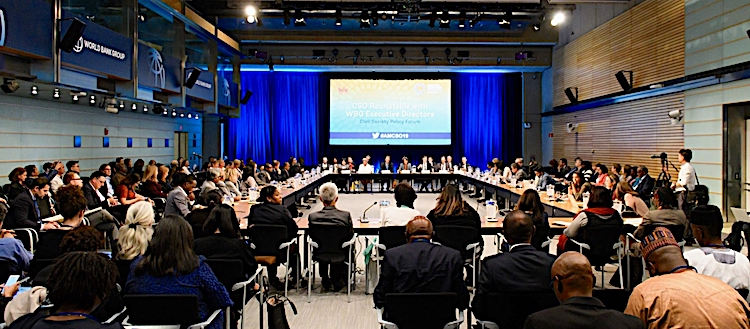Viewpoint by Patricia Moreira
Patricia Moreira is Managing Director of Transparency International, the global civil society organisation at the forefront of the fight against corruption. This viewpoint originally appeared on the World Bank blog.
BERLIN (IDN) – In recent years, we have witnessed a significant shift in approach of both the World Bank and International Monetary Fund (IMF) to addressing the concerns of civil society and recognising their contribution to development outcomes.
As one of the largest sources of development finance, the World Bank plays a prominent role in driving progress on alleviating poverty and boosting shared prosperity. However, as practitioners, policy experts and advocates working directly with communities, civil society also plays an important role in addressing these critical global challenges.
In October 2019, the Civil Society Policy Forum of the World Bank and International Monetary Fund (IMF) annual meetings offered several opportunities to make the case for why both organisations should be doing more to engage with civil society, at national and global levels, to drive the global development agenda.
During the Forum, I had an opportunity to moderate a roundtable discussion between civil society and the World Bank’s executive directors, where participants highlighted issues of shared concern that were critical to global development today: the climate crisis, human capital and young people, the shrinking space for civil society, transparency and accountability, fragility, conflict and violence, and inclusion.
Together with my co-moderator, Hervé De Villeroche, co-dean of the World Bank board and executive director for France, we heard from civil society organisation (CSO) representatives from Nigeria to Fiji and Afghanistan to Honduras. Discussion ranged from what the World Bank can do to support governments to deliver quality education without discrimination in Ghana to how the Bank should respond to closing civic space in the Middle East and North Africa (MENA) region.
Governments, international institutions and the private sector all play a critical role in finding shared solutions to these common challenges. Civil society groups can also add value and contribute to the global agenda, even as space for civil society to speak out continues to shrink in many countries around the world.
While gathering input from a host of organisations in preparation for the roundtable discussion, I was struck by the invaluable and diverse insight of many of my CSO peers. Specifically, CSOs can contribute to the important work of the World Bank in at least four ways:
The CSO community is composed of some of the world’s greatest experts on global development issues. Non-governmental organisations (NGOs) can provide up-to-date, evidence-based input and suggest concrete areas where progress is needed, with specific recommendations for action. However, this expertise will remain untapped unless CSOs are consulted consistently and have opportunities to provide input.
CSOs can hold governments and international institutions accountable to their existing commitments and ensure the effective implementation of World Bank recommendations and assessments.
CSOs can help communicate important World Bank policies in a way that is more accessible to citizens. We can also provide feedback on how these policies may impact people in the countries that the World Bank works with and help break down complex, technical jargon.
To be effective, NGOs need to have a seat at the table. Some international bodies are reluctant to include civil society representatives in the same way they include business. But, this only serves to promote exclusivity and distrust, and it is why many people around the world, including in Latin America and the Caribbean are quickly losing confidence in public institutions.
As you can see, there is a lot to gain from engagement with CSOs that make them ideal candidates for establishing partnerships and strategic alliances. Trust us! Engage with us! We can be your strong allies!
CSOs greatly appreciate the World Bank’s commitment to working with us in this important forum. While the roundtable was a great opportunity for CSOs to discuss important issues with the World Bank directly, it should also pursue additional opportunities to collaborate and work together with CSOs throughout the year. It is critically important for the World Bank and CSOs to work together at both the global and national levels, to engage more effectively across these spaces. [IDN-InDepthNews – 10 November 2019]
Photo: CSO Roundtable with Executive Directors at 2019 Annual Meetings. © World Bank.
IDN is flagship agency of the International Press Syndicate.
facebook.com/IDN.GoingDeeper – twitter.com/InDepthNews

